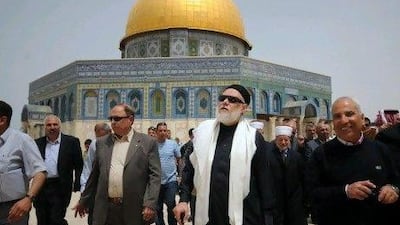JERUSALEM // By breaking a longstanding practice of Muslim clerics refusing to come to this Israeli-controlled city, the visit of the Grand Mufti of Egypt here on Wednesday generated consternation among Islamists back home.
But some analysts see Sheikh Ali Gomaa's Jerusalem trip as a calculated decision that put displaying solidarity with Palestinian claims on this city as more important than adhering to an informal boycott of Jerusalem that Arabs use to express their opposition to Israeli occupation.
"It means that he is not only a religious man. He's a political man," said Hani Masri, a Palestinian political analyst who heads the Ramallah-based Palestine Media, Research and Studies Centre.
The mufti, Egypt's most powerful cleric, received flak from Islamists for making the trip to pray at Jerusalem's Al Aqsa mosque, Islam's third-holiest site.
No Egyptian mufti has been in Jerusalem since Israel captured East Jerusalem and its holy sites, the West Bank and the Gaza Strip during the Arab-Israeli war of 1967.
Such a trip would risk being seen as supporting normalisation of ties with Israel and its military occupation of the Palestinians.
"What he did cannot be justified and cannot be endorsed," Osama Yassin, a member of Egypt's Muslim Brotherhood, wrote on the group's website yesterday.
Clerics from the Sunni Muslim world's top centre of learning, the Cairo-based Al Azhar, were expected to meet today to discuss the Grand Mufti's visit, which dominated the headlines of Egyptian dailies.
To many Muslim and Christian Palestinians, the mufti's defiance of tradition was a welcome show of support.
"The visit is important just because it tells the Palestinian people that they have support and that people on the outside believe in their struggle for freedom and rights," Father Faris Aridah of the Latin Patriarch of Jerusalem, which represents Catholics living in the area.
He said the visit was a response to a call last February by the Palestinian Authority president, Mahmoud Abbas, for Arab Muslims and Christians to visit Jerusalem. It was a plea for Arabs to see firsthand the effects of the Israeli occupation on the Palestinians.
Yesterday, a Qatar-based cleric, Yusuf Al Qaradawi, rejected the Palestinian leader's call and implored followers not to visit Jerusalem.
"We must feel as though we are banned from Jerusalem and fight for it until it is ours," Mr Qaradawi said from Doha. He said that those "who visit legitimise an entity which plunders Palestinian lands, and are forced to cooperate with the enemy's embassy to receive a visa".
Mr Masri, the political analyst, likened the Grand Mufti's decision to visiting a prisoner, which does not mean one necessarily agrees with the jailer.
It probably was not a decision he took lightly. For one thing, the Jerusalem foray required working with Israeli authorities.
"He did not pay visits to any Israeli officials, although the visit was coordinated with Israel," said Yigal Palmor, spokesman for Israel's foreign ministry.
Sheikh Ali was appointed Grand Mufti in 2003 by Egypt's then president Hosni Mubarak. When Mubarak was in power, it was impossible to persuade Egyptian religious leaders to visit Jerusalem, said Nabil Amr, a member of the Palestine Liberation Organisation's Central Committee who served as Palestinian ambassador to Egypt for two years during the Mubarak era.
The former Egyptian leader feared being seen as too close with Israeli leaders. Mr Amr said he had tried - to no avail - to persuade Egyptian religious figures to visit on several occasions during Mubarak's rule.
"It's not easy for anyone to visit to Jerusalem under the occupation of Israel, so this is a big issue," Mr Amr said.
"We welcome this visit and we encourage all the Muslims and Christians to come to not just Jerusalem but other Palestinian cities."
hnaylor@thenational.ae
Follow
The National
on
& Hugh Naylor on
* With additional reporting by the Associated Press

